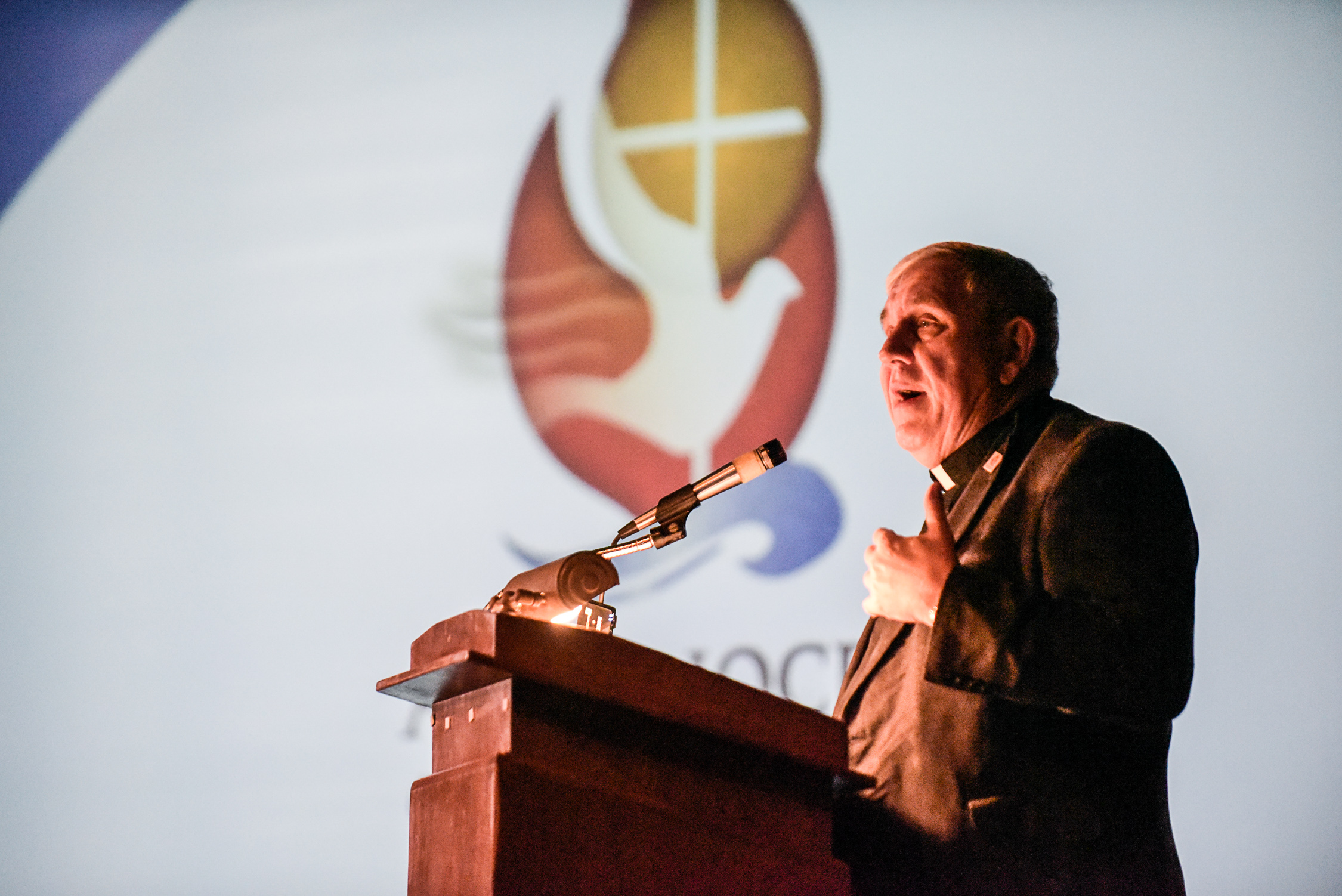
Archbishop Jerome E. Listecki discussed his past 11 years and his vision for the next three years during his keynote address on Saturday, Oct. 23, at the Synod anniversary event. (Photo by Juan Carlos Medina)
Though the anniversary event had been postponed for more than a year because of the pandemic, Archbishop Jerome E. Listecki was able, on Saturday, Oct. 23, to relive and review what he considers the greatest achievement in his 11 years leading the Archdiocese of Milwaukee: The 2014 Synod.
In his keynote speech at the Mary Mother of the Church Pastoral Center, Archbishop Listecki reviewed his 11 years serving the Archdiocese of Milwaukee and outlined his future years.
“I have been married to the archdiocese for 11 years and living, working and loving the people entrusted to my care,” he said. “It has all been accomplished due to efforts working together in the name of Jesus. I am looking to the sunset rather than the sunrise in my tenure at the archdiocese.”
The 2014 Synod led to greater communication, increased seminarians and stronger Catholic schools, Catholic Charities, Spanish and black Catholic ministries, as well as ministry to the deaf and hard of hearing. Comparing himself to a doctor examining a patient in a physical, Archbishop Listecki said the archdiocese was in good health.
“Our parishes are strong and vibrant, thanks to the leadership of our priests, pastoral staff, and laity,” he said. “I offer that we still have work to do. The people of our archdiocese have a deep level of faith. The depth of faith here gives me the depth of confidence that was affirmed in the synod and is a vision of the future.”
Focusing on pandemic recovery and a return to Sunday Masses, Archbishop Listecki acknowledged that only 25 percent of Catholics attended Sunday Mass before the shutdowns. His goal is to be more proactive in getting more to understand the importance of returning to public worship.
Explaining that he will be presenting his resignation to Pope Francis in two and a half years when he reaches 75 years old, Archbishop Listecki will likely serve for three more years before a replacement is named.
“Realistically, we have about three years left together, and first, I have to share that we need to call people to worship. I can’t emphasize more that worship is the basis for all we do. God is God, and we are not,” he said. “Worship helps us to understand that. Our allegiance is to God. We have the wonderful example of Jesus Christ at the Sacrifice of the Mass at Calvary as a reminder of how much God loves us.”
The second aspect Archbishop Listecki said he wanted to focus on in his last years as archbishop is the Sacrament of Reconciliation. He reminded attendees that St. John Paul II said that Catholics would be empowered and invigorated in the Third Millennium by two sacraments: Eucharist and Reconciliation.
“Repent is a call from the Gospel and a challenge to us to live the life Jesus instilled in us,” he said. “I also believe the depth of faith here is due to various devotional groups that continue to practice like St. Therese, Rosary Evangelization, Women of Christ, Men of Christ, and others who live out the Faith. The devotional life does that. It is important that the devotional life continues to embody the commitment that people should have living out their faith. We must also embrace our diversity as a Church. Race, ethnicity and languages are a sign of strength and commitment to the love of God and neighbor.”
Acknowledging that he sometimes forgets the challenges and difficulties over the past 11 years, Archbishop Listecki recalled the dark period when the archdiocese faced bankruptcy on the first anniversary of his installment as a new bishop.
“There was a sense of loss, a lack of confidence, and then we had five and a half years of dealing with the sins of the abuse of minors,” he said. “We were and are a different Church because we took significant steps to protect the safety of the young and ensured they will always remain protected. We have worked at programs for the young and transparency in those programs. There needs to be similar programs established in the secular institutions. We must never forget what brought us here, and we must always be vigilant.”
Archbishop Listecki added that it is imperative to strengthen our Catholic schools, for they create an environment where true freedom is found and where students affect and deepen the faith of their parents. He said our Catholic schools are strong, but they can’t be a separate entity, just as religious education serves as an integral role in the ongoing faith of families.
“We also need to focus on the needs of single-parent households and the whole families,” he said. “We use this as a model in who we are as a Church. The family is our connection to one another. In our very blood and for us in faith is the blood of our brother, Jesus Christ.”
